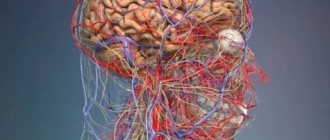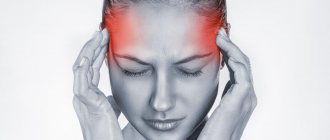Transient global amnesia
- transient memory impairment for current and past events lasting up to a day. Accompanied by loss of orientation while maintaining consciousness of one's own personality. Some temporary disturbances of higher nervous functions are possible. Diagnosis includes a neurological examination, EEG, MRI, duplex scanning of cerebral vessels; if necessary, PET scan of the brain. It is necessary to exclude acute vascular pathology of the brain, epilepsy and intracerebral tumor. There is no specific therapy yet. The underlying pathology is treated; according to indications - psychotherapy.
General information
In 1956, an American neurologist of Russian origin, Maurice Bender, first identified and described transient global amnesia as a separate disease.
This is how he classified a person’s condition when his memory is lost over a short period of time - from several minutes to a day or more.
The scientist found that such a pathology is rare : approximately 3-5 cases are registered per hundred thousand people. However, such amnesia is not always accidental: it recurs after some time in approximately 25% of the patients examined.
Moreover, the duration of complete oblivion increases with each new case, and this seriously worries doctors.
Today's research shows that temporary memory loss with this disease usually does not exceed 24 hours . And most often, an attack of amnesia lasts for 2-3 hours, after which it stops as suddenly as it began.
The so-called attack of transient global amnesia usually affects middle-aged and elderly people aged 50 to 70 years.
Despite the relative rarity of such pathologies, modern medicine studies this disease closely : it is believed that TGA in many cases foreshadows the development of brain tumors and is the first signal of their onset.
Transient global amnesia - a dangerous illness or a minor nuisance
Amnesia is a phenomenon characterized by loss of memory by the patient. Transient global amnesia is one of the components of the phenomenon described above, which can occur in middle-aged and elderly people. These processes are poorly understood and defy logical understanding, but first things first...
General information
So, transient global amnesia (TGA) manifests itself in the body’s complete loss of the ability to remember information for a short period. In addition, a person who has undergone this attack cannot remember events that happened to him earlier.
This condition can last from half an hour to several days. As a rule, after the attack has passed, the patient’s memory and all other lost functions return, as if nothing had happened. A similar phenomenon was first described in 1956 by M. Bender.
According to the observations of specialists, this syndrome is quite rare and can occur only in 3-5 people out of 100 thousand. However, the percentage of repeated manifestations of amnesia in people who have experienced it once is 20–25%.
Moreover, the period during which the patient loses cognitive functions increases.
Causes
The true causes of the development of the disease remain a mystery to scientists and doctors, since it was not possible to understand what influences the formation of such a phenomenon. And until now, neurologists have only speculated about them, but not confirmed them. Nevertheless, research continues and at the moment scientists believe that transient global amnesia can be formed due to:
Negative consequences after the Valsava test, which provokes the development of transient mesotemporal ischemia. The Valsava test (strained exhalation with the nose and mouth closed) is used to diagnose cardiovascular diseases, normalize pressure when immersed in water, as well as during takeoff and landing on an airplane.
- migraine;
- violation of venous circulation;
- psycho-emotional overload;
- mild traumatic brain injury;
- disruption of the functioning of such areas of the brain as the thalamus, hippocampus, cingulate gyrus, orbitofrontal cortex;
The hippocampus is the area responsible for the sense of smell; thalamus - responsible for the redistribution of information from the sensory organs to the brain; cingulate gyrus - responsible for a person’s determination; orbitofrontal cortex - responsible for decision making
- epilepsy;
- coronary angiography (effect of dye);
Coronary angiography is a method of examining the coronary arteries, during which a dye is pumped into the artery and powerful drugs (barbiturates) are taken. Where is everything
Undoubtedly, this does not mean that people who regularly experience nervous tension will necessarily be subject to this phenomenon, but they are at risk.
Among other things, this phenomenon can occur as a result of the localization of various types of tumors in the brain, operations to remove brain aneurysms, etc.
There is also an opinion that the occurrence of such a phenomenon can be caused by microthrombi, which cannot be diagnosed using the means available to doctors.
Symptoms
The symptoms are quite simple and clear. The patient suddenly stops remembering what happened to him a week, month, or year ago.
This applies not only to memories of events, but also to all senses (smell, touch, vision, hearing). Also, the patient loses the ability to remember any information and constantly asks the same question.
Due to the inability to remember the answer received, the question is asked again, and so on, until the end of the attack.
In addition, the patient feels depressed, somewhat dazed. He may be irritated or, on the contrary, too calm. Transient amnesia is characterized by the fact that the patient is able to say his name and the simplest things associated with his personality.
He is socially active.
To say that this phenomenon occurs spontaneously is incorrect. Naturally, a person feels some negative symptoms, but does not correlate them with the impending problem.
So, immediately before an attack, the following symptoms may occur:
- Strong headache.
- Deterioration of vision.
As mentioned earlier, the duration of the attack directly depends on what type of attack it is; the more similar attacks that have been suffered before, the longer the period of memory loss.
The danger of this disease lies in the fact that some memory functions may not be restored in the case of long periods of action of this syndrome.
Causes
For a long time, the origin of this disease was a mystery to doctors and neurologists.
Only with the advent of the possibility of scanning cerebral vessels, one of the reasons began to be considered as a violation of blood circulation in certain areas of the cerebral vessels.
Some researchers believe that the main reason for the development of this pathology is epilepsy, especially at the initial stage .
Other possible reasons are also mentioned :
- frequent migraines;
- emotional experiences and tension;
- traumatic conditions;
- poor circulation in the veins;
- such memory loss can be not only a signal of the onset of tumor processes, but also a consequence of their appearance;
- By the way, the influence of alcohol and potent drugs cannot be ruled out.
Some psychologists and neurologists associate temporary memory disorders with strong emotional experiences. But the obligatory, inevitable onset of amnesia after suffering stress is still excluded.
often reacts in the opposite way to emotional outbursts : he remembers the whole picture of what happened down to the smallest detail.
Symptoms and signs
In principle, the signs of this malaise lie, as they say, on the surface.
A person suddenly forgets what happened to him a few moments ago or, for example, within an hour.
It looks like suddenly emerging from the water after a dive.
Unlike other types of amnesia, the patient, some time after the attack, realizes where he is, orients himself in space and recognizes those around him. Moreover, he may not immediately realize that some time period has fallen out of his memory.
A characteristic symptom of transient global amnesia is that a person suddenly finds himself unable to remember the information he receives, for example, the answer to a question he was asked.
As a result, the question is asked again, sometimes repeatedly, and this is noticed by others or doctors if a diagnosis is made.
Then the following symptoms begin to appear:
- Often a person looks depressed and confused.
- Severe irritability may occur.
- Then it may be replaced by an inexplicable calm.
- Sometimes a person suddenly forgets his own name for a while.
- In the first seconds after the attack, he suddenly begins to look with surprise at himself, those around him and the situation around him.
Some researchers are convinced that this condition is preceded by primary symptoms :
- noticeable blurred vision;
- attacks of headache;
- a certain slowness of reactions and movements.
The attack can pass independently without any outside therapy. In this case, the ability to remember is completely restored .
Transient global amnesia - who turned off the memory?
Memory impairments occur in the practice of neurologists no more often than in 3-5% of cases. Usually these are long-term deviations, such as anterograde or retrograde amnesia, which are eliminated after high-quality drug treatment of the root cause.
Transient global amnesia is an acute, transient condition accompanied by a total loss of memories of past events with complete preservation of personality and normal orientation in space. The sense of time may be partially lost.
Unlike other forms of amnesia, transient or transient amnesia recedes on its own within a maximum of 24 hours from the beginning of the episode; more often the process lasts 1-2 hours and ends with the complete restoration of the neuropsychic qualities of the individual.
The exact mechanisms of the condition have not been established, therefore there is no need to talk about symptomatic treatment. Urgent identification of the etiology of the process and treatment of the root cause is necessary. This will solve the issue of preventing further relapses. There is no need for inpatient treatment or inpatient diagnostics. The profile specialist is a neurologist.
Complications
The consequences of transient amnesia are minimal. In itself, it does not pose any danger, except for cases of possible unintentional self-harm during the peak period.
As was said, at the time of memory loss, patients are not completely adequate; they may end up in a dangerous situation (road accident, fall with injuries incompatible with life, drowning, etc.).
The threat is posed by underlying processes such as infections (dementia, neurological deficits), stroke, traumatic brain injury (neurological deficits, death), tumors (death in the medium or short term).
Prognosis and prevention
Depends on the main diagnosis. Transient global amnesia itself disappears without a trace after, at most, a day from the beginning. Relapses are possible, but no one gives an accurate forecast of when the episode will recur or whether it will recur at all.
The condition cannot be prevented with specific methods because little is known about it. It is enough to avoid stress; if this is not possible, learn to cope with mental stress correctly, treat infectious pathologies in a timely manner, do not smoke, do not consume alcohol, and especially drugs. Also adjust hormonal levels, especially with established diabetes.
Source: https://ponervam.ru/tranzitornaya-globalnaya-amneziya.html
Diagnostics
If the attack, according to the patient’s story, was short-lived, he should still be carefully questioned about his past and present condition, since these symptoms may be signs of other, more serious brain diseases .
Acute vascular pathology should be immediately excluded: the possibility of a stroke or other hemorrhage. To do this, an MRI of the brain is usually performed. This procedure is also carried out to identify possible tumor processes.
If the diagnosis is carried out during the attack itself, electroencephalography registers an increase in bioelectrical activity.
However, usually the diagnosis of the disease is limited to the exclusion of other possible ones, since a careful conversation with the patient is usually sufficient .
Treatment methods
Separate specific treatment for transient global amnesia, as a rule, is not carried out; the cause is treated if it is identified.
If no pathological process is detected in the vessels or the person does not have epilepsy, by and large, it is not even clear what, in the end, to treat.
In addition, in the vast majority of cases, the attack goes away on its own , without a trace, the memory is restored to its previous extent, with the exception of that small period of time, which, as they say, has completely disappeared from perception.
You can, of course, pay attention to the psychological state of the patient after the attack .
Some may experience depression, especially if the trouble occurred during a very important conversation or communication with a loved one, in front of whom you do not want to look in an unattractive light.
In such a situation, you can prescribe mild tranquilizers or simply supportive psychotherapy.
In this situation, folk remedies should not be excluded . It is believed that tincture of Eleutherococcus can prevent relapse. A decoction of walnut or thyme leaves is beneficial.
Patients are often prescribed appropriate medications to improve blood circulation in the brain.
What should not be confused with?
It is necessary to differentiate from a transient ischemic attack , in which with TGA the causes are the same, but the mechanisms are different, which leads to a stroke.
The symptoms of a developing stroke are more pronounced, appear suddenly and are acute, layered on top of one another.
Signs of stroke that are atypical for TGA:
- impaired sensitivity and contraction of the muscles of the face, upper and lower extremities, right or left half of the body,
- permanent loss of speech and its understanding,
- disturbance of visual perception,
- loss of balance, dizziness,
- acute headache,
- feverish condition,
- complaints of nausea, vomiting.









